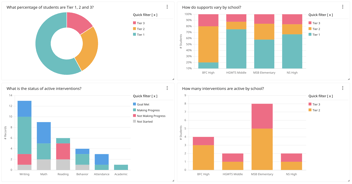
Executive function and self-regulation skills are defined as “the mental processes that enable us to plan, focus attention, remember instructions, and juggle multiple tasks successfully.” Humans are not born with these skills, but our brains are wired to develop them during childhood, adolescence, and early adulthood. Executive function skills encompass three key components:
- Inhibitory control (aka “self-control”): the ability to control automatic urges like thoughts, behavior, and emotions
- Working memory: the ability to store short-term information for cognitive tasks
- Mental flexibility: the ability to shift our thought patterns and behavior with less rigidity
These skills are important because they help children follow directions, pay attention, manage time, complete projects, and stay organized. In an adult context, executive functioning helps people cooperate, solve problems, and work together—all key elements of job performance and productivity.
Rising demands in middle and high school
Developing executive function is all about connecting regions in the brain with neural pathways so that they can function together and more effectively. Although some people naturally have more difficulty with executive functions—for example, those with attention-deficit hyperactivity disorder, whose prefrontal cortexes regulate attention less well than the “average brain”—anyone can improve these skills with practice.
Children of course learn and practice executive function skills at home with their families, especially siblings. But there has also been a growing push for teachers and schools to help kids improve their executive function skills because they help not only with learning in a school environment, but they also serve as preparation for employment and general life success in adulthood.
Educators are therefore looking for tools and ideas on ways to support students as they build executive function skills. One of the most critical areas that we often hear from teachers, particularly in middle school and high school when the academic demands on students rise, is that organizational skills and time management come up again and again as pain points for students.
What this looks like in real life is that students don’t know which assignments are due when, and for how long, how to prioritize one thing over another, and how to manage their schoolwork and study time alongside other commitments like extracurricular and family activities. They also forget to turn things in.
Designing a digital student planner
We suggest teachers start by leveraging their learning management systems (LMS) because it is an ever-present and accessible place for students to check for assignments. Due dates help too, but assignments come in all shapes and sizes, and it’s not always as simple as “do this assignment first because it’s due the soonest.”
With Schoolytics student accounts (free for students over age 13), students can also get a view of how they are doing on their assignments, with a simplified list of upcoming and missing work that spans all their classes. This helps them manage their workload better and develop those much-needed executive functioning skills. Here are two ways that Schoolytics is most helpful:
Students see a simple overview of their progress (with a small dose of data and data science skills thrown in!), which provides motivation and self-knowledge on how to focus their time.
Students can also easily sort lists of upcoming assignments and missing assignments by due date and points (to get a clearer sense of which assignments may be more important to do first).
Teachers and students can sign up for Schoolytics using their Google Classroom credentials.
We know that executive function skills are valuable for students and that these skills are teachable and learnable. Using the combination of the LMS plus Schoolytics to give students an understanding of their own progress is a powerful way to support this skill development and offer an opportunity for students to take charge of their own learning. Schoolytics is just one way to empower students to increase executive function, build organizational skills, and increase agency.
Related Articles


Enhancing MTSS with Student Data: A Comprehensive Approach
A well-implemented Multi-Tiered System of Supports (MTSS) framework is a key tool for schools and...

Building a Learning Graph: The Bedrock of Holistic Student Analytics
True learning analytics requires far more than data from a single platform. While assessment...

